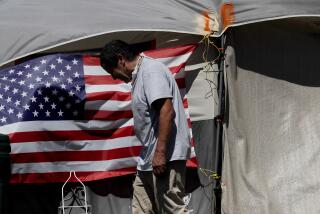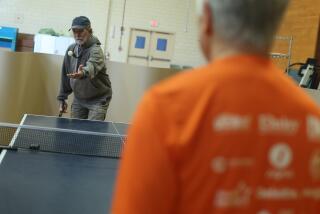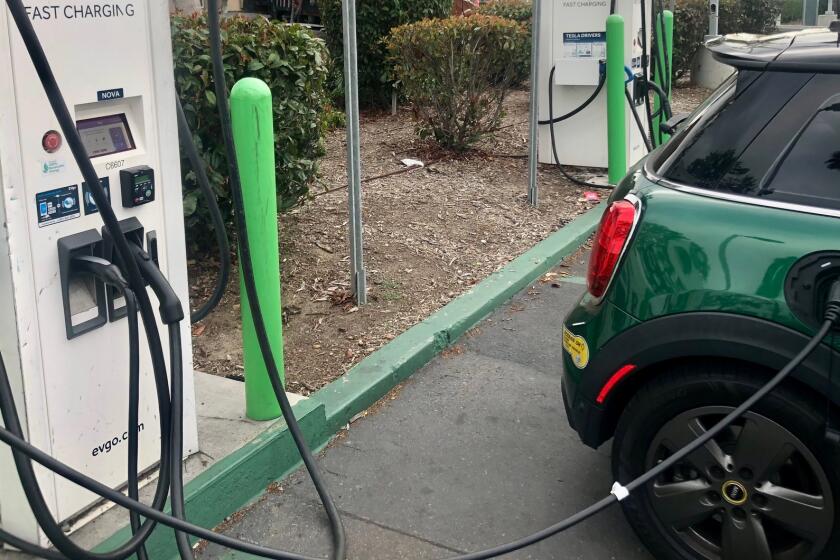Give back to vets who have given their all
During a recent visit to the veterans hospital in Los Angeles, I ran across a young man fresh out of the Army. He had fought in Afghanistan and was recovering from some of his wounds. He was also homeless and, quite frankly, a little frustrated by what he saw as cumbersome and inefficient layers of bureaucracy between the departments of Defense and Veterans Affairs.
It had taken weeks to finish his separation paperwork, months to get his disability rating (which determines his compensation), and it will likely take years before he can be completely self-sufficient. Simple things like holding down a job and owning a home seem anything but simple to him right now.
“I gave my country 100%,” he said. “All I ask for is 100% in return.”
Maybe I’m biased, but that doesn’t seem like too much to ask.
It’s not too much to ask that we bind the wounds of war. And we are. More than 35,000 troops have been injured in Operation Iraqi Freedom and Operation Enduring Freedom, many of whom might have died had it not been for the excellent medical care they received at field and military and veterans hospitals all over the world.
But I worry a lot about the wounds we don’t see, the ones we don’t yet fully understand. Recent studies suggest that nearly 20% of Iraq and Afghanistan veterans have incurred traumatic brain injury, and a like number suffer from post-traumatic stress. Many have both. And it doesn’t help that there is still a stigma attached to mental health problems.
We have to move past that. We have to change our culture. Leaders at all levels need to step forward and seek for themselves and their people the counseling they all deserve.
Asking for help is not asking for too much.
It’s also not too much to ask that we look after the families of the fallen. Not everyone makes it home from war. For each of the more than 4,800 servicemen and women who have been killed since 9/11, there are mothers, fathers, brothers, sisters, husbands, wives and children who suffer unspeakable loss. These families, too, have sacrificed so much -- everything really -- and we can’t forget our obligation to stand by them for the rest of their lives.
The rest of their lives. That’s a long time. But that’s the debt we incur -- to help our veterans and their families move on with the rest of their lives.
The truth is that they want the same things every other American wants. They want to own their own homes, find good jobs, send their children to good schools.
During that same trip to Los Angeles, I spent some time at a facility called New Directions. The staff there offers a wide variety of services for homeless veterans, including job training and placement, parenting and money management classes, legal and financial assistance, counseling and remedial education.
Residents leave the program with a job, housing, a savings account, computer skills, renewed self-confidence and the support of mentors and peers.
The need is real. California has the largest population of homeless veterans in the nation, nearly 50,000 -- about 13,000 are in Los Angeles. And some experts believe we are producing homeless vets faster than we ever have. Programs like those at New Directions are a good start for these men and women, as are the Labor Department’s “Hire Vets First,” the VA’s “Stand Down” counseling and assistance events, and numerous other grass-roots efforts. But so much more needs to be done.
As we get ready to celebrate Thanksgiving -- with hundreds of thousands of troops still deployed around the world and many others preparing to leave the service -- we need to remember that important point.
We live in a country that doesn’t force our young men and women to pick up arms and go fight. We don’t have to. They do it willingly, even eagerly. Not because they enjoy danger or killing or sacrifice, but rather in spite of those things. They serve and they work so hard so that someday -- maybe -- our children and grandchildren might not have to.
All they want in return is our gratitude, 100% of it. It’s not too much to ask.
Navy Adm. Mike Mullen is the chairman of the Joint Chiefs of Staff.
More to Read
A cure for the common opinion
Get thought-provoking perspectives with our weekly newsletter.
You may occasionally receive promotional content from the Los Angeles Times.










